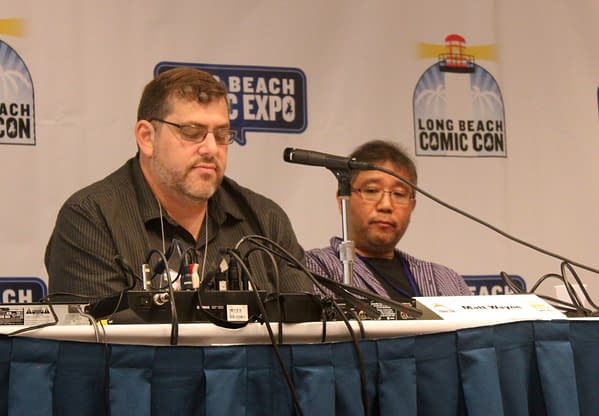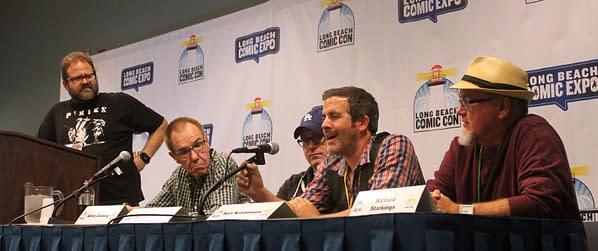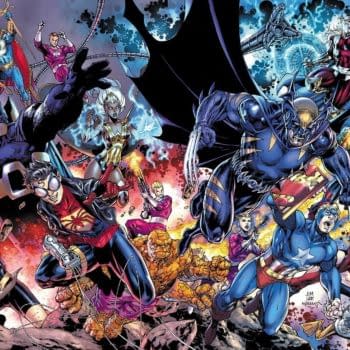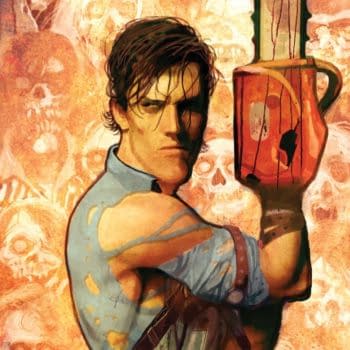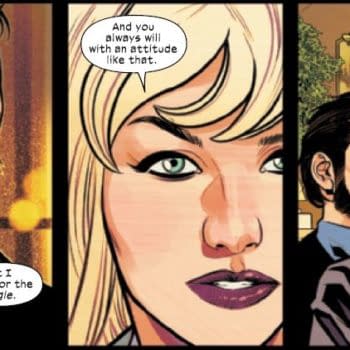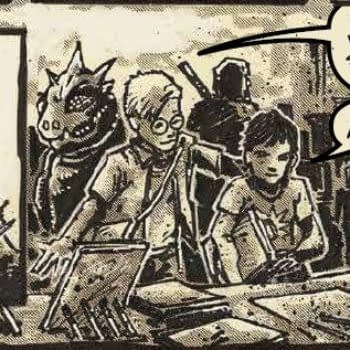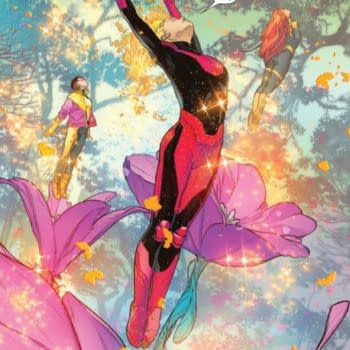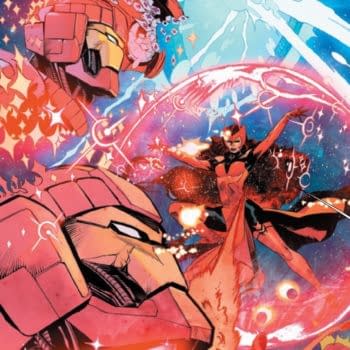Posted in: Comics, Recent Updates | Tagged: Comics, Dwayne McDuffie Award, entertainment, female heroes, film, Joshua Hale Fialkov, long beach comic con, Madeleine Holly-Rosing, Paige Halsey Warren, Phil LaMarr, Steven L. Sears, the crow
Long Beach Comic Con Programming Brought Out Diversity, Writing Tips, Key Anniversaries, And Creating Dynamic Female Characters In Comics
By Michele Brittany
A full schedule of panels throughout both days at the Long Beach Comic Con offered how to workshops, anniversary commemorations of popular comic IPs, as well as topical discussions about issues the industry faces today, and these were just a few offerings for the programming portion of LBCC. Over the course of the con, held the last weekend of September at the Long Beach Convention Center, I had picked out a handful of seminars to attend.
The Dwayne McDuffie Award
My Saturday morning started out by attending the LBCC's announcement for the first annual Dwayne McDuffie Award for Diversity. Phil LaMarr (Static Shock!) had the honor to announce this brand new award honoring the legacy of Dwayne McDuffie, who was a comic book and television writer, founded Milestone Media, nominated for the Eisner Award multiple times, and won a Humanitas Award for Static Shock! LaMarr was joined by Matt Wayne (Justice League Unlimited), the award's director, McDuffie's widow Charlotte (McDuffie) Fullerton (Ben 10: Omniverse) as co-director, Neo Edmund (Red Riding, Clan of the Vein), William J. Watkins, (former editorial assistant, DC Comics) and Glen Murakami (Batman Beyond, Teen Titans). The latter three serve as part of the selection committee.
Comic book writers and artists (primary) of books published during this year – print or digital – that full the criteria of "broadening the range of characters portrayed in comics, adding to the variety of creators contributing to the medium, influence on the marketplace and contributions to the advancement of women, minorities and LGBTs in comic books and pop culture" are encourage to complete the submission form and email the form, along with a pdf of the project, by December 31, 2014 to be considered. The committee qualified that since this is the first year, they were limiting the scope of the submissions to comic books, but they hoped to expand the medium in subsequent years.
Submissions will be judged by a committee made up of McDuffie's colleagues: Joseph Illidge (former editor of Milestone and DC Comics), Len Wein (Swamp Thing, Wolverine), Heidi MacDonald (editor in chief of The Beat), Joan Hilty (Bitter Girl), and Eugene Son (Ultimate Spider-Man), along with Edmund, Murakami, and Watkins. The committee will short list to five nominees and the winner will be announced at the Long Beach Comic Expo on February 28, 2015. And what is the award? LaMarr enthusiastically stated it would be "exposure and recognition."
The committee expressed looking for projects that are in the spirit of McDuffie's legacy, agreeing that it was up to each submitter to define diversity. In addition, they hoped this award would start a dialogue in social media circles in the coming months by utilizing descriptive hash tags such as #DwayneMcDuffie and #McDuffieAward.
Purveying Words: Writing For Comics
"The internet has democratized the industry," moderator Joshua Hale Fialkov (The Bunker, The Life After) said as he started off LBCC's #MakeComics Series titled Purveying Words: Writing for Comics Saturday afternoon. Joining Fialkov for the hour-long panel was David Gallaher (Hulk: The Winter Guard, Vampirella), Gerry Conway (The Amazing Spider-Man, Justice League of America), Sterling Gates (Supergirl, Superman: War of the Supermen), Ken Kristensen (Todd, The Ugliest Kid On Earth), and Richard Starkings (Hip Flask, Elephantmen).
The creative process is an elusive concept, so panels such as these tend to be more informative rather than at a granular level of specifics. That said, I did find the topics interesting. For example, Conway and Gates' experience with "arranged marriages" between themselves and artists enlightening. They spoke of the importance of establishing good communications, a point that all of the panelist agreed upon as crucial in any project.
Surprisingly, comic book writers have to do more than just write. Gallaher described being a "traffic manager" by having to manage deadlines and making sure the artist has work so they do not have to wait. Kristensen added that he acts as a conduit and buffer between artists and editors. He explained that he interprets editorial feedback into constructive directions for the artists. Starkings said creating pacing for the artist another facet to the writer's role. He said that he did so by giving artists "breaks" between highly detailed panels with easy panels.
Fialkov kindly left a bit of time for Q&A. One audience member asked the panelists' preference of working with an artist or doing the writing and art themselves. I was curious with their responses would be especially since I have heard so often in other panels that being a dual writer/artist is optimal for this industry. The majority voiced they prefer working with an artist because of the collaborative process. Starkings said of the process that it allowed "borrowing confidence, borrowing direction" between writer and artist, while Gallaher concurred that "it can bring out the best in each other."
Remembering Eric Draven: The Crow 20th Anniversary
Has it been 20 years since Brandon Lee personified a generation through his portrayal of Eric Draven in the film, The Crow (1994, directed by Alex Proyas), based on James O'Barr's graphic novel? There are few films that are able to represent a particular time yet are able to transcend the passage of time. I believe The Crow is one such story. It is thanks to O'Barr's determination to remain faithful to his belief that The Crow "is a love story at its heart."
O'Barr wasn't expecting a film would necessarily result when his story was optioned, because this was prior to the more serious hero films. Figuring he couldn't lose anything, he asked for many controls because he wanted a good film if it was made. He asked for and got casting, writing and soundtrack control. And, he still owns the character!
Johnny Depp was the original choice for the lead role, but around the time he was being considered, he declined in part due to working on another make-up intensive character, Tim Burton's Edward Scissorhands (1990). O'Barr had seen Lee in Rapid Fire (1992), then met him, but was "skeptical that he was too nice." However, once O'Barr saw Lee in make-up, he was convinced that Lee was Eric Draven.
The Crow had a modest budget of $10M and was filmed on a small set in Wilmington, North Carolina. O'Barr said it was a tough shoot: shot at night with rain machines on all of the time, and the weather in Wilmington was unseasonable cold. And, like Eric and Shelly, tragedy befell Lee. "The Crow is Brandon Lee's legacy," O'Barr stated, clearing his throat of the sadness he obviously still feels.
Someone hesitantly asked about the new Crow movie. O'Barr said he was the most vocal against having The Crow remade, until he met with the director, Francisco Javier Gutierrez, who said he didn't want to remake the original film, but wanted to make O'Barr's graphic novel. They also talked about actors and both agreed on Luke Evans (Dracula Untold, The Hobbit) as Eric.
O'Barr did state that the film is in pre-production. It will be a period piece, set in 1970s Detroit utilizing color, black & white and grindhouse film and techniques. Later, back at O'Barr's booth, I got a chance to ask if any of the original cast would make cameo appearances. According to O'Barr, it has been discussed and may come to fruition.
Beyond Clichés: Industry Experts Discuss How To Create Awesome Female Characters
For the last hour of the con, I could be found in Room 103 A/B where I was moderating the panel Beyond Clichés: Industry Experts Discuss How To Create Awesome Female Characters. I was joined by panel founder Neo Edmund (Red Riding, Clan of the Vein), Paige Halsey Warren (Busty Girl Comics), Geekie Awards nominated Madeleine Holly-Rosing (Boston Metaphysical Society), and Steven L. Sears (Xena: Warrior Princess, Sheena, Swamp Thing) for an hour to discuss their writing process for creating female characters that challenge well-worn tropes.
The panelists agreed that while they all had their own approach to writing, they were in consensus that they developed the character first. The gender decision however was influenced by a number of factors. Working in television, Sears and Edmund often get executives that want to change the gender of the female characters they have created. For instance, when Edmund was shopping a story featuring a female lead, he continually ran into executives wanting him to change her to him. In the end, he stayed committed to his story and wrote a novel instead, keeping his leading lady just that.
I asked about the use of stereotypes as a stepping off point for creating a dynamic woman. Sears said he loved using them because he could "draw the audience in with their expectations, then spring the trap" thereby turning the audience expectation into a surprise character twist. Sears explained that this approach fought the notion that women apologize for their differences, using Wonder Woman (the Linda Carter television series) as an example. He said that she would bring bad guys to justice, then apologize for her actions.
Halsey Warren spoke of "checking your privilege" when developing characters. In other words, did the characters ring true? Were their actions in keeping with their station in society? Were their dreams and aspirations substantiated by their upbringing and experiences? And, ultimately, was the character believable? And as a group, the panelists expressed that female characters were much more interesting and realistic if they were flawed, not media-molded perfections.
In that final step of deciding on the gender, Holly-Rosing expressed the importance of understanding media consumption. Although women make up about 50% of the population and readership of comics, one would think that that same ratio would be represented in our media, however that is not the case. For example, Holly-Rosing quoted the findings of a study (Geena Davis Institute on Gender in Media) where in a crowd scene, women will typically make up just 17% of the group, yet it will be perceived as normal, the normalization of percentages. Ultimately, women are under-represented, regardless if they are walking stereotypes or dynamic, fascinating females.
As with Fialkov's panel, again, I think writing is a personal journey and techniques that work for one person, may not work for someone else. However, if a person can take away a nugget of information or idea, then the panel has been successful. And hopefully, the next time a person is developing a character, they will think about creating an awesome female character.
I find juggling panel attendance with time on the show floor always a balancing act, especially when the programming has so much to offer. I thought the #MakeComics series was an excellent idea and I wish I could have attended more of them! However, I'm pleased with the panels I did attend (and moderate). If you haven't checked out any panels before, I do highly recommend going. It is one way to hear what the industry experts have to say and the pearls of wisdom they pass on to those of us who aspire to write and draw comics.
All photos used courtesy of Michele Brittany
Michele Brittany is an independent popular culture scholar and semi-professional photographer and editor of the forthcoming title James Bond and Popular Culture: Essays on the Influence of the Fictional Superspy (McFarland & Company). She regularly posts reviews and analysis on the spy/espionage genre on her blog, Spyfi & Superspies and can be followed at Twitter @mcbrittany2014.




